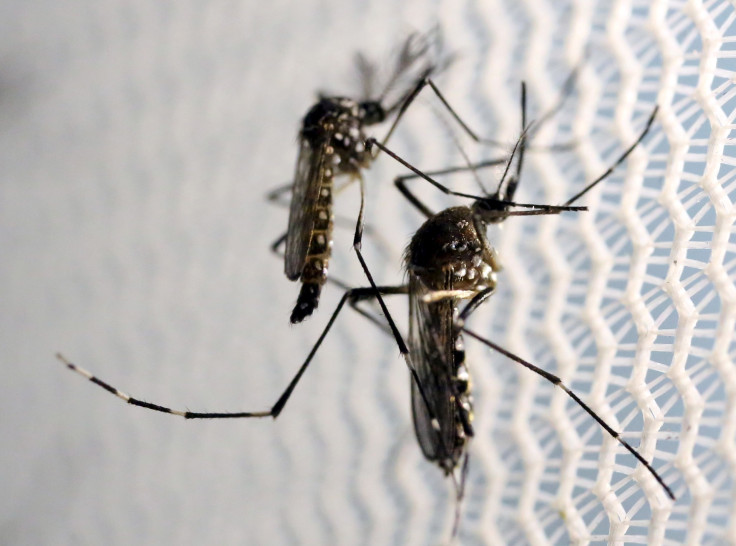Science, Public Health And 'Mutant' Mosquitoes: Proposed Florida Keys Experiment Sparks Bitter Debate Over Genetically Modified Aedes Aegypti

Not everyone in the Florida Keys is thrilled at the prospect of having swarms of genetically engineered male mosquitoes zipping about, even if the mutant bugs could protect people from the Zika virus.
Fearing the potential devastation associated with this mystifying virus, which in Brazil has been linked to cases of birth defects and neurological problems, U.S. authorities are keen to find new ways of wiping out Aedes aegypti, the mosquito that carries it. In the Florida Keys Mosquito Control District, officials are hoping to soon test OX513A, a mosquito genetically modified by the biotechnology company Oxitec to produce offspring that die young.
But public comments about the experiment are beginning to roll in, and the angry clamor over these mosquitoes is exposing a broader and much thornier issue: Citizens so deeply distrust companies and their motives that they are vehemently skeptical of the scientific innovation that authorities say might help prevent a full-blown public health crisis. And, as any mosquito control expert will admit, without public buy-in, efforts to quash mosquito populations will be in vain. The debate underscores how, even in the 21st century, the marriage of science and public health can be less than harmonious.
“The company [that] has produced this mosquito has profits in mind and profits alone,” wrote Suzanne Coleman, who described herself as a health professional, in a public comment March 15. The week before, the U.S. Food and Drug Administration (FDA) announced it found that releasing the mosquito into an area of the Florida Keys would have “no significant impact” on the surrounding ecosystem. “I understand that mosquito-borne illnesses are a human concern,” Coleman said in her comment, “but it seems that the impact of this new and unstudied organism has not been appropriately evaluated.”
Coleman is not alone in her views.

“The FDA determination ... is highly flawed,” wrote another commenter, Michael Welber. Slamming the agency’s use of Oxitec’s environmental assessment, he said, “It’s the typical fox/henhouse way of conducting business.”
In a way, Welber is correct. When it evaluates devices, medicines and other products under its purview, the FDA does rely on evidence provided by the companies that develop those innovations and are applying for marketing approval by the government.
“That’s standard fare,” said Steve Morrison, director of the Global Health Policy Center at the Center for Strategic and International Studies, a think tank in Washington. But the FDA doesn’t take that data at face value, he said. “They have experts who evaluate the raw data that’s submitted.”
But because it’s the company that’s attempting to prove, with its own data, its product is safe and effective, earning the trust of a skeptical public that sees corporations as focused solely on profits can be tough.
Oxitec’s 140-page environmental assessment has indicated the company conducted a risk assessment “to determine the potential for significant environmental impact.” The risk was calculated as the possibility of something going wrong — such as mosquitoes escaping the lab, or surviving and breeding outside the lab, or hurting the environment or people — multiplied by the impact in the event it did. Oxitec concluded “there are unlikely to be any adverse effects on nontarget species, including humans.”
The Key Haven trial would be far from the first for the OX513A mosquito, which since 2009 has been tested in Brazil, the Cayman Islands and Panama. In each of the test areas, local Aedes aegypti populations were squashed like bugs, cut down by more than 90 percent, all with “no environmental footprint,” Oxitec said.
Every year, the Florida Keys Mosquito Control District spends roughly $1 million to control Aedes aegypti. According to the district, this notoriously hardy breed is “the most problematic” mosquito species because it transmits diseases such as dengue fever, which afflicted dozens of people in an outbreak in Key West in 2009 and 2010. To keep Aedes aegypti under control, the district attempts to reduce the number of places where mosquitoes can lay eggs by encouraging residents to clean out old flowerpots, tires and other vessels that can hold standing water. The district also sprays larvicides and other insecticides, and is willing to try just about anything to keep mosquito populations under control.

“We want any possible tool” as long as it’s effective and safe for the environment, said Beth Ranson, a representative of the Florida Keys Mosquito Control District.
Still, locals remain unconvinced, skeptical and increasingly frustrated.
When the district first started talking to Oxitec after the dengue outbreak in 2009 and 2010, Mila de Mier, a mother of three from Key West, liked the idea.
“It sounded wonderful. Finally, a mosquito fighting another mosquito,” de Mier said. Gradually, however, she changed her mind, concerned that the FDA and Oxitec had given the public too little information and too little say in the matter. She feared that the consequences of releasing OX513A — on people, on the environment — had not been fully researched.
In 2012, de Mier launched a Change.org petition. “There are more questions than answers, and we need more testing to be done,” it reads. “Will the public be able to stop this program from happening if we don’t want it? We were told that ‘public opinion would be taken into account.’” To date, 162,000 people have signed the petition.
The mosquito control district and Oxitec said they have not encountered local opposition to testing the mosquito in the Florida Keys. They cited an online survey of 964 U.S. residents conducted in February that found 78 percent support using genetically engineered mosquitoes to fight the Zika virus.
As part of the approval process required before Oxitec can release OX513A, the FDA posted March 14 its finding that the company’s mosquito would not have a significant negative impact. The public now has 30 days to comment on the finding, and as of Tuesday the FDA had received 258 comments. Some comments disparage all genetically modified organisms, while others beg the district to begin using OX513A. The comment period closes April 13, and the FDA is supposed to take those comments into account before either allowing or disallowing the trial.
“It’s tricky. You’re unlikely to get 100 percent approval for anything, anywhere, in any country, including in the U.S., these days,” said Melinda Moore, a senior natural scientist at the Rand Corp., a nonprofit research organization based in Santa Monica, California.
Still, the system is supposed to help strike a balance, so people can trust the FDA will approve only products that work and are safe, and voice their concerns otherwise. “The regulatory process is meant to take into account the balance between effectiveness and risk,” Moore said.
When it comes to the Zika virus, public health authorities have warned there’s no time to lose.
“FDA is fully prepared to leverage its authorities to the fullest extent, as appropriate, to help accelerate the development and availability of safe and effective products with the potential to help mitigate the Zika virus outbreak as quickly as the science will allow,” said Juli Putnam, an FDA representative. With respect to Oxitec’s mosquito, the agency will issue a final decision only after it reviews public comments.
Even if the FDA rejects the use of the mosquito in Key Haven, the mosquito could find its way to other districts in Florida and beyond.
“We have had considerable interest from other areas of the U.S.” Matthew Warren, Oxitec’s press officer, said in an email, “Particularly in Florida and the south/southeast.”
Meanwhile, de Mier, who launched the anti-mosquito petition, wants more time to convince the FDA not to allow Oxitec’s mosquito into Florida.
“Thirty days, we don’t feel like is enough,” de Mier said of the comment period. “I don’t want my children to be guinea pigs.”
© Copyright IBTimes 2024. All rights reserved.






















